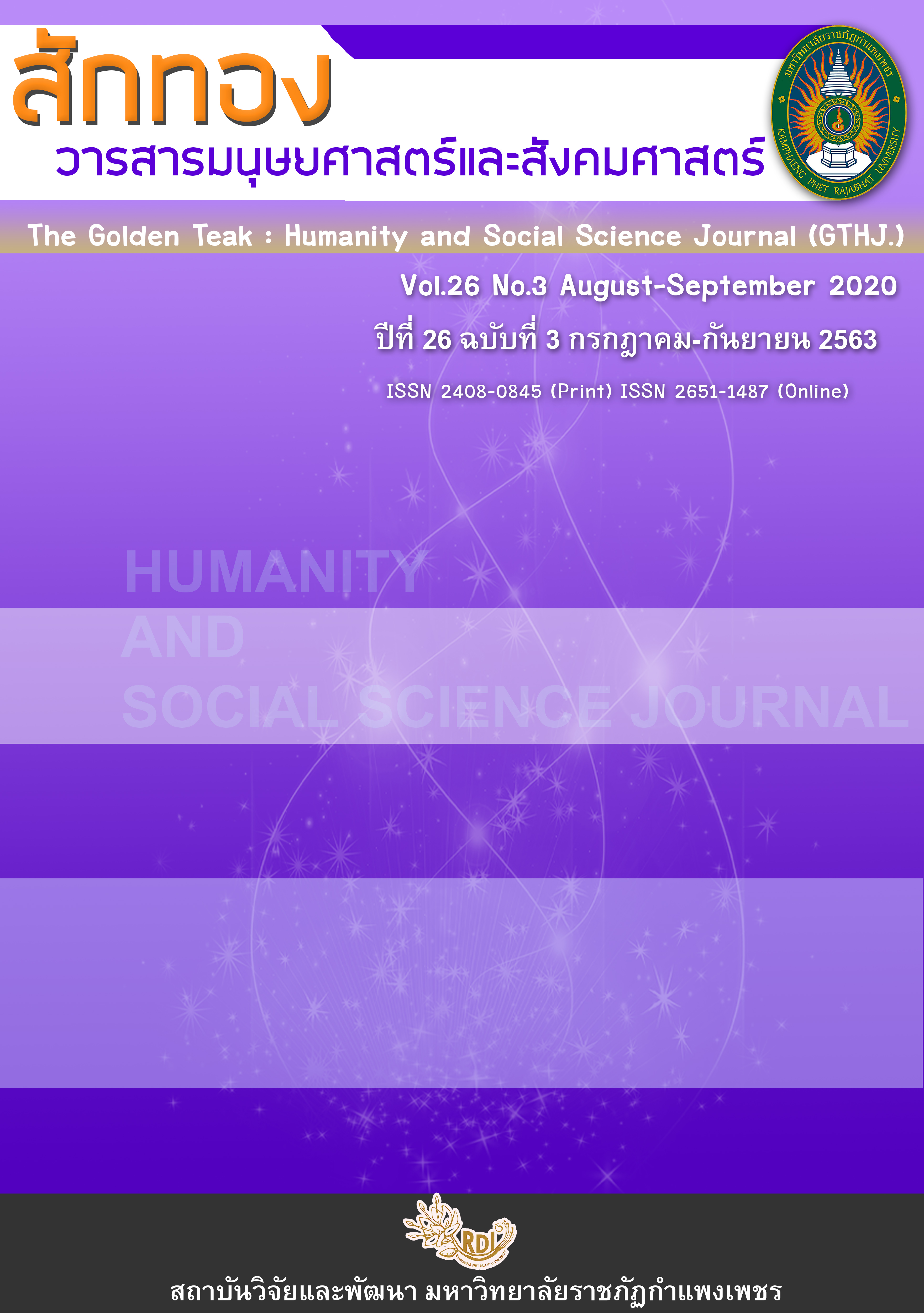District Health Management for Diabetes and Hypertension Risk Groups by District Health Coaching Team: A case of Kosamphi Nakhon, Khampangphet
Main Article Content
Abstract
District health system is a priority in community health management. This article aims to design and develop social mechanism for managing diabetes and hypertension, at district level. Transformative learning theory and empowerment are spurred to increase 140 voluntary health coaches including district health practitioners, community health volunteers, local politicians, non-government officers, professionals from local academic institutions, and community leaders. 80 volunteers from risk groups were selected from three Kosamphi Nakhon sub districts in Khampangphet. Then, grounded theory has been employed during qualitative practice and lesson learning process. The data collection include interview guideline, observation checklist, learning recorded form and empowerment evaluation form. Data were analyzed by using content analysis and descriptive statistic, and t-test before presenting in the form of good practices. The results showed that transformative learning process and capacity building model significantly helped increasing capacity of health coaches in district health management. This system significantly reduced risk behaviors of diabetic and hypertension risk groups an alpha level of 0.05. Moreover, the system harmonized with socio-cultural aspect of the target community.
Article Details

This work is licensed under a Creative Commons Attribution-NonCommercial-NoDerivatives 4.0 International License.
บทความที่ได้รับการตีพิมพ์เป็นลิขสิทธิ์ของวารสาร สักทอง : วารสารมนุษยศาสตร์และสังคมศาสตร์ สถาบันวิจัยและพัฒนา มหาวิทยาลับราชภัฏกำแพงเพชร
ข้อคิดเห็นใดๆ ที่ปรากฎในวารสารเป็นวรรณกรรมของผู้เขียนโดยเฉพาะ ซึ่งมหาวิทยาลัยราชภัฏกำแพงเพชรและบรรณาธิการไม่จำเป็นต้องเห็นด้วย
References
Chaileetongdee, S. (2009). Decentralization by Transferring Health Centers: A Case Study of the 4 Urgent Provinces. Mahasarakham: Faculty of Health Sciences,
Mahasarakham University.
Chaisawang, C. (2009). The Development of Local Health Assurance Funds in Fao Rai District, Nong Khai Province. Master’s thesis, Mahasarakham University. (in Thai)
de Savigny, D., & Adam, T. (Eds.). (2009). Systems Thinking for Health Systems Strengthening. Geneva : WHO.
Dirkx, J.M. (1998). Transformative Learning Theory in the Practice of Adult Education : An Overview. PAACE Journal of Lifelong Learn¬ing, 7, 1-14.
Esperat, M.C., et al. (2008). Transforming for Health: A Framework for Conceptual¬izing Health Behaviors in Vulnerable Populations. Nursing Clinics of North America, 43(3),
381-395.
Institute for Population and Social Research. (2018). Thai Health Report 2018. Bangkok: Amarin Printing & Publishing Public.
Loet-thawontham, K. (2008). The Lesson Learned Visualizing Result of Local Health Insurance Fund, Wat Phleng Sub-District, Wat Phleng District, Ratchaburi.
Ratchaburi : Boromarajonani College of Nursing.
Mayor, V. (2006). Long-term Conditions. 3: Being an Expert Patient. British Journal of Community Nursing, 11(2), 59-63.
Merriam, S. B., Cafferella, R.S. & Baumgartner, L.M. (2007). Learn¬ing in Adulthood : A Comprehensive Guide (3 rd ed.). San Francisco : Jossey-Bass.
Mezirow, J. (1991). Transformative dimensions of adult learning. San Francisco : Jossey-Bass.
Mezirow, J. & Taylor, E.W. (Eds.). (2009). Transformative Learning in Practice : Insight from
Community, Workplace, and Higher Education. San Francisco, CA : Jossey-Bass.
National Health Commission Office. (2016). Thai Health 2016. Bangkok: National Health Commission Office.
Nitayarumphong, S. (1990). Evolution of Primary Health Care in Thailand : What policies worked?. Health Policy Plan, 5, 246-254.
Phillipi, J. (2010). Transformative Learning in Healthcare. PAACE Journal of Lifelong Learning, 19, 39-54.
Tangcharoensathein, V., et al. (2018). The Development of the Health System in Thailand: The Foundation of Achieving Universal Health Security. Bangkok : International
Health Policy Program.
Thom, D.H., et al. (2016). A Qualitative Study of How Health Coaches Support Patients in Making Health-Related Decisions and Behavioral Changes. Annals of Family
Medicine, 14(6), 509-516.
Thongphuthorn, S. (2010). The Effectiveness of Using Participatory Programs in the Development of Standardized Urban Health Centers, Mahasarakham Province.
Master’s Thesis Mahasarakham University.
Trento, M., et al. (2004). A 5-year Randomized Controlled Study of Learning, Problem Solving Ability, and Quality of Life Modifications in People with type 2 Diabetes Managed by Group Care. Diabetes Care, 27(3), 670-675.
Ubon Ratchathani Provincial Health Office. (2013). The Summary of Public Health Development, Ubon Ratchathani. Ubon Ratchathani : Siritham Offset.
UCSF Center for Excellence in Primary Care. (2016). Health Coaching. [Online]. Available : http://cepc.ucsf.edu/health-coaching. [2018, October 2016].


